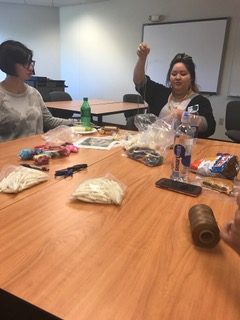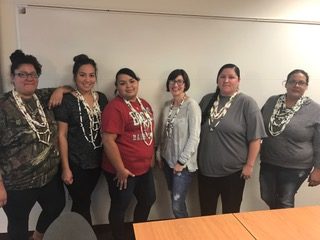
Cyndi Pyatskowit wearing Menominee bone necklace.
Children read better and more when they have access to culturally relevant books. The College of Menominee Nation participated in the Wakanyeja “Sacred Little Ones” ECE Initiative from 2011-15, and during that time developed a series of Menominee-based informational books to strengthen the approach to engaging children in early literacy practices.
The rationale for the development of Menominee books was that, to benefit all Menominee children; they would be able to see themselves and their communities within the stories presented in the books. Having a set of informational books focused on animals and plants from the Menominee Reservation was a great beginning, but there was a need to take the idea further by developing a collection of culturally relevant activities to use with the texts.
Notable scholar and educator Gloria Ladson-Billings (1994) stated that “knowledge is continuously recreated, recycled, and shared by teachers and students. It is not static and unchanging.” CMN took lessons from Ladson-Billings’ work to develop engaged literacy events which emphasized making reading activities relevant to the Menominee Head Start children. When culturally relevant books are available children, they are able to relate and confirm experiences presented in the books. In addition, teachers can engage multiple perspectives teaching children how to ask questions and entertain new ideas.
In developing these books, CMN believes that Menominee children should be able to see themselves and their communities reflected in the books read to them. Furthermore, culturally relevant activities aligned with the book theme can provide additional support to engage and connect Menominee children to their cultural backgrounds.
The development of these informational books began in CMN’s early childhood education course titled, Infancy and Early Childhood. All of CMN’s TCU students are Native Americans, and most are Menominee tribal members. It was important for the TCU ECE students to learn how to read the books and also engage in supporting children’s thinking aloud about ideas and information presented in the books.

College of Menominee Nation Early Childhood Education Students
The pre-service teachers learn to develop expectations for young children to play an important role in their early literacy development, including learning how to make observations, share comments, and ask questions. At the end of the Infancy and Early Childhood course, each TCU student created developmental appropriate activities to accompany each informational book.
The CMN students then presented the book, along with their activities, to children and families at the Menominee Head Start program. To get the CMN students excited for this we had a presenter come to our class to instruct how to make a Menominee bone necklace. This necklace is cultural and used in by women during powwows. This successful experience illustrated how engaging students in something significant and useful to them makes learning easy and fun.Each student later presented the activities they developed to align with a Menominee informational book while wearing their necklaces.

CMN ECE Students with Menominee Bone Necklaces
Post by R. Cyndi Pyatskowit, College of Menominee Nation, ECE Faculty






